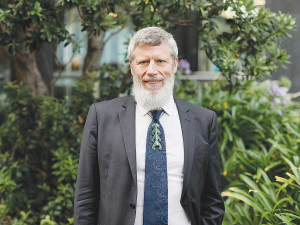Damien O’Connor: NZ united on global trade
When it comes to international trade, politicians from all sides of the aisle are united, says Labour's trade spokesman Damien O'Connor.
 Climate Change Commission chair Rod Carr says that by pricing agricultural emissions, New Zealand is "charting a new path".
Climate Change Commission chair Rod Carr says that by pricing agricultural emissions, New Zealand is "charting a new path".
The Climate Change Commission has recommended a detailed farm-level pricing system outside the New Zealand Emissions Trading Scheme (NZ ETS), according to a new report.
The report, sent off to the Minister for Climate Change on 30 June, was released to the public last week and details how ready farmers and the agriculture sector are for emissions pricing.
The report states that the sector would not be ready for a detailed system by 2025, but in the interim, a basic farm-level system using elements of the He Waka Eke Noa proposal would provide a path to progress towards a more detailed system.
“Our analysis shows that almost all eligible farmers can be ready to participate in a basic farm-level system by 1 January 2025,” the report states.
However, it notes there are several major changes that would need to be made to the He Waka Eke Noa proposal if the Government were to consider adopting elements of it.
One of these, sequestration, is already recognised through the NZ ETS.
“Recognising non-NZ ETS sequestration through on-farm vegetation as suggested by the He Waka Eke Noa proposal should be progressed in a separate system, which could recognise and reward a wide range of benefits, such as biodiversity and water quality,” it states.
However, it states that bringing this on-farm vegetation into a farm-level emissions pricing system will add complexity and create inequity between farmers and other sectors, and wouldn’t significantly improve emissions.
Another issue is that of the pricing of synthetic nitrogen fertiliser.
The Commission says that they should be priced at the manufacturer and importer level in the NZ ETS as soon as practicable.
“This would achieve a more broad and equitable coverage for emissions from synthetic nitrogen fertiliser across the country.”
In the chair’s message which opens the report Commission chair Rod Carr says that by pricing agricultural emissions, New Zealand is “charting a new path”.
“Being a ‘first mover’ globally, with a welldesigned agricultural pricing policy, will provide a strong, credible example to other countries and help maintain our reputation for innovation and progress,” Carr writes.
Importantly, he says emissions pricing has to be delivered alongside a broader policy package to contribute to meeting the emissions reduction targets set.
“A farmer-focused and cost-effective pricing system is the best way to deliver that,” he says.
“While a detailed farmlevel system outside the New Zealand Emissions Trading Scheme would be the best approach in the long term, the Government will need to implement a basic farm-level system in the time it has – which can be rapidly scaled up.”
Carr writes that many farmers have already started to move towards lower emissions practices on farm.
“The sector has made progress towards measuring and reporting on-farm agricultural emissions, and making sure farms have plans in place to manage their emissions.”
HWEN Responds
In a statement, He Waka Eke Noa programme director Kelly Forster said the partnership was pleased the Commission agreed that a farmlevel split-gas approach is the preferable option.
“The Commission has also acknowledged the significant work the sector has done to prepare farmers, by supporting them to know their emissions numbers and have a plan.
“We welcome the Commission’s confidence that farmers will be ready for a farm-level system by 2025,” Forster said.
She said He Waka Eke Noa recognised more work needed to be done on the detail.
“The Commission has taken a different view to He Waka Eke Noa on recognising sequestration and levying N fertiliser. We will need to study their analysis before responding in detail.
“However, it is important to remember that the He Waka Eke Noa recommendations are based on giving farmers control over all the levers that impact on their emissions, including sequestration and fertiliser use, so they can take a holistic view across their farm system as they make decisions. We would not want this wholefarm- system approach to be undermined.”
Voting has started for the renewal of DairyNZ's milksolids levy.
The most successful catchment groups in NZ are those that have 'a source to sea' approach.
Associate Agriculture Minister and Manawatu dairy farmer Andrew Hoggard says the free trade agreement (FTA) negotiated with India is not a bad deal and his party, Act, will support it when it goes before Parliament.
Newly released data from Environment Canterbury (ECan) Farm Environment Plan (FEP) audits are showing a dramatic lift in environmental performance across the region.
A solid recovery of global dairy prices this year makes a $9.50/kgMS milk price almost a shoo-in for this season.
As New Zealand marks the United Nations’ International Year of the Woman Farmer 2026 (IYWF 2026), industry leaders are challenging the misconception that women only support farming.
OPINION: Fonterra may be on the verge of selling its consumer business in New Zealand, but the co-operative is not…
OPINION: What does the birth rate in China have to do with stock trading? Just ask a2 Milk Company.